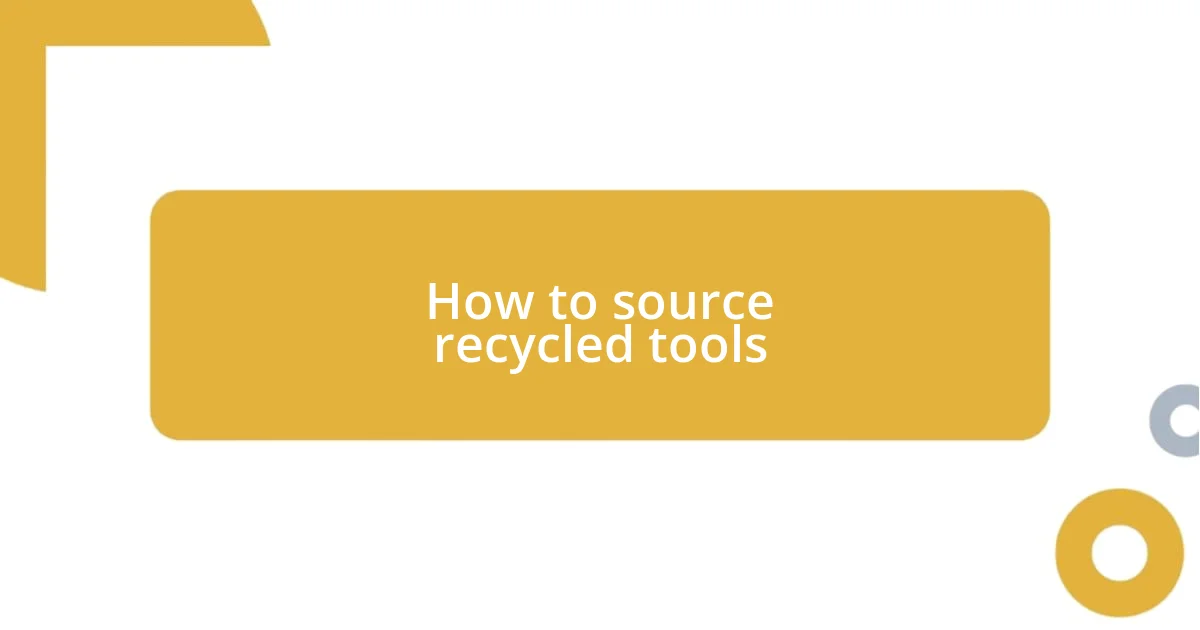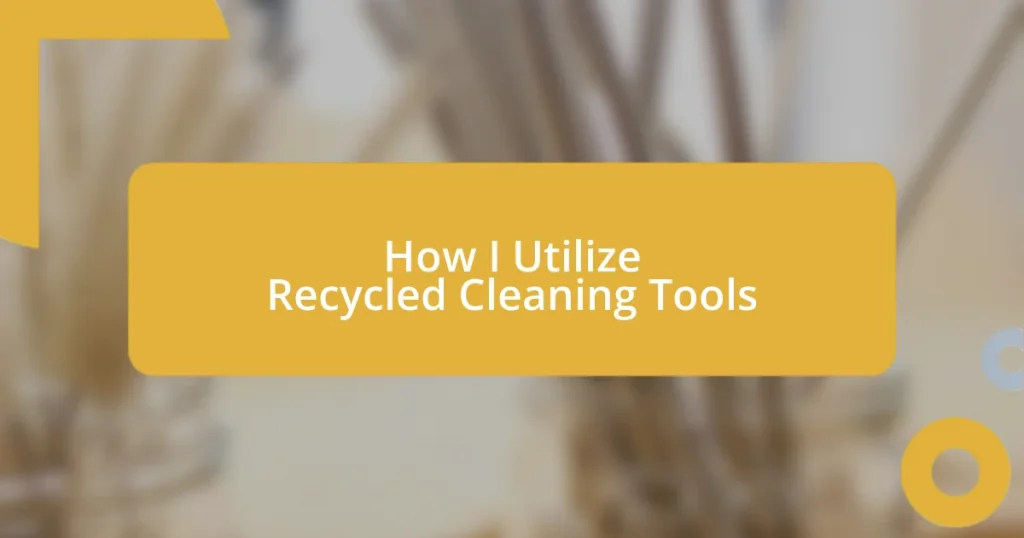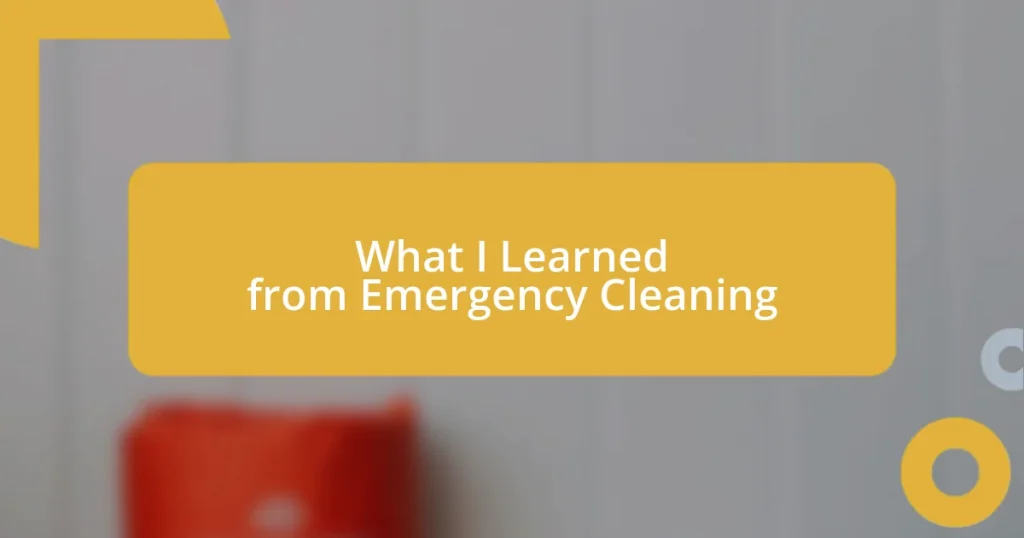Key takeaways:
- Recycling cleaning tools reduces waste, conserves resources, and fosters creativity in repurposing items for new uses.
- Utilizing recycled tools from thrift stores, community swaps, and eco-conscious brands supports sustainability and can also be cost-effective.
- Regular maintenance and organization of recycled tools enhance their lifespan and improve overall cleaning efficiency.

The importance of recycling tools
Recycling tools is crucial not just for reducing waste, but also for conserving resources. When I think about the countless cleaning tools I’ve used over the years, it strikes me how many of them would just end up in a landfill if I hadn’t opted for recycling or repurposing. Isn’t it a bit overwhelming to consider how the things we use daily could have a second life instead of contributing to environmental degradation?
I remember a time when I decided to turn an old mop handle into a plant support for my garden. It made me realize that the act of recycling doesn’t just help the planet; it can also spark creativity and resourcefulness in our lives. What if, instead of throwing away that worn-out sponge, we brainstormed ways to give it a new purpose? Such small shifts in mindset can have a ripple effect on our sustainability efforts.
Moreover, by recycling tools, we support a circular economy that prioritizes sustainability over wastefulness. This approach not only lessens resource extraction but also minimizes pollution caused by manufacturing new items. Have you ever thought about how much energy is saved when we reuse instead of producing anew? It’s an eye-opening realization that strengthens the argument for making recycling a fundamental part of our cleaning routines.

Types of recycled cleaning tools
When delving into the types of recycled cleaning tools, I’ve found an array of items that not only perform beautifully but also tell a story of sustainability. For instance, using cloths made from repurposed fabric has completely transformed my cleaning routine. It brings me joy knowing I’m reducing waste while enjoying the soft touch of a once-loved material. I once stitched together leftover fabric scraps into multi-purpose cleaning rags, and honestly, it felt good to see them in action.
Here are some recycled cleaning tools that have made a difference in my home:
- Mops and Brooms: Crafted from recycled plastics or wood, these tools are effective and environmentally friendly.
- Spray Bottles: Reusable bottles can come from repurposed glass or plastic, minimizing single-use plastic waste.
- Sponge Alternatives: Products made from recycled materials, like cellulose or coconut husks, can replace traditional sponges.
- Cleaning Cloths: Old t-shirts or towels cut into squares can serve as excellent cleaning cloths.
- Brushes: Look for brushes made from recycled bamboo or plastic, offering durability and eco-friendliness.
I remember the satisfaction of discovering a biodegradable scrub brush made entirely from recycled materials; it felt like a little victory for both my cleaning efforts and the planet alike. Each time I reach for these tools, I’m reminded of how even the smallest changes can lead to significant impacts on our environment.

How to source recycled tools
When it comes to sourcing recycled cleaning tools, I find that local thrift stores and second-hand shops are treasure troves. There’s something so fulfilling about rummaging through aisles filled with discarded items, wondering how many of them can find a new purpose. Just yesterday, I discovered a sturdy broom that only needed a fresh coat of paint. It felt like rescuing a forgotten friend; now, it not only cleans my floors but adds a splash of color to my cleaning corner.
Another great source is community swap events or online platforms like Freecycle and Facebook Marketplace. I’ve participated in local swaps where people leave tools they no longer use, emphasizing the spirit of sharing. The thrill of picking up a gently used cleaning tool, learning its story, and knowing I’m helping to extend its life is genuinely rewarding. What’s even better is that these avenues promote connection within the community as we rally around the idea of sustainability together.
Additionally, some eco-conscious brands offer cleaning tools made from recycled materials. I’ve come to trust several companies that prioritize sustainability in their manufacturing processes. For instance, I recently bought a mop that’s not only made from recycled plastic but also comes with a biodegradable replacement head. Knowing that my purchase supports recycling initiatives feels incredible. How do you like to source your tools? Perhaps turning your purchasing choices into an act of kindness for the planet could inspire you, just like it has for me.
| Source | Description |
|---|---|
| Thrift Stores | Find unique second-hand cleaning tools that require minimal renovation. |
| Community Swaps | Participate in local exchanges to trade or acquire previously loved tools. |
| Eco-Conscious Brands | Purchase new tools made from recycled materials, supporting sustainable practices. |

Benefits of using recycled tools
One of the most significant benefits I’ve experienced from using recycled cleaning tools is the positive impact on the environment. Each time I reach for one of my recycled products, I can’t help but reflect on the reduction in waste that comes from repurposing materials. It’s a small but meaningful way of contributing to a larger cause. Do you ever contemplate the ripple effect of your choices? I certainly do, and it makes me feel more connected to my surroundings.
Economically, opting for recycled tools can also be a win-win situation. When I source items from second-hand stores or swap events, I save money while also embracing sustainability. The thrill of discovering a top-notch cleaning item that once belonged to someone else brings a sense of adventure to my cleaning routine. Just last week, I scored a set of cleaning cloths that were practically brand new, which felt like I hit the jackpot – and my wallet appreciated it too!
Lastly, using these tools tends to wrap my cleaning sessions in a touch of nostalgia. Each item has its own story that adds a layer of character to my home. For example, my favorite spray bottle was once a fancy juice bottle, and I’ve turned it into a daily essential for my home. There’s something incredibly satisfying about knowing I gave that bottle a new life instead of watching it end up in a landfill. Isn’t it amazing how a simple choice in cleaning supplies can evoke such joy and fulfillment?

Maintaining recycled cleaning tools
To keep my recycled cleaning tools in top shape, I find regular maintenance is key. After each use, I make it a point to give my tools a quick rinse or wipe down. It only takes a few moments, but it prevents grime buildup and keeps them looking fresh. Trust me, a little effort goes a long way in extending the life of your tools.
I also inspect the tools occasionally to ensure they’re functioning well. For example, I had a mop once where the head started fraying, and instead of tossing it aside, I simply replaced the head, making it feel new again. Can you imagine the satisfaction of saving something from the waste bin just by being a bit proactive? That’s what maintenance of recycled tools feels like—like a small victory on my sustainability journey.
Finally, I like to organize my recycled tools properly. I’ve set up a specific spot in my utility shelf just for them. This way, they’re easy to access, and I can keep track of what I have. It also encourages me to use them more often because they’re part of my routine. Have you thought about how organization can impact your cleaning habits? I can tell you, a tidy space for your tools makes cleaning less of a chore and more of a rewarding experience.















